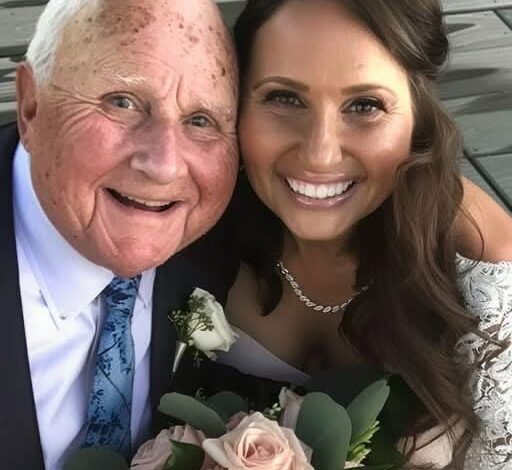MY MIL KICKED MY PARENTS OUT OF MY WEDDING BECAUSE THEY “DIDN’T PAY FOR IT” My wedding day. The day I had dreamed of forever. I was standing next to Daniel, holding his hand, feeling nothing but happiness. And then my MIL stood up. She clinked her glass, flashing this fake, sweet smile. The room went quiet. “I just want to say something,” she said, dragging it out like she was about to make some touching speech. Then she turned to my parents. “It’s a shame when people think they can just show up to a wedding they didn’t pay a dime for.” I swear, you could hear a pin drop. My dad’s hand tightened on the table. My mom’s face went pale. Daniel gripped my hand. “Mom, stop.” But nope, she kept going. “Since our side paid for this wedding and they didn’t, I think it’s only fair that they leave.” She was actually kicking out my parents. At my wedding. I felt frozen. My heart was pounding. And then my dad did something I never expected. He smiled. “Alright,” he said, standing up and adjusting his suit. “We’ll go. But before we do, just one last thing.” MIL leaned back in her chair like a queen granting a final mercy. “Oh, by all means.” She had no idea what was coming. My dad lifted his glass, looked Daniel and me right in the eye, slowly reached into his pocket and pulled something out. ⬇️Story continues in the first comment👇

Weddings, Family, and the Price of Pride: A Cautionary Tale of Love, Money, and Karma
Introduction
Weddings are meant to be celebrations that unite families and friends in a shared expression of love and hope for the future. They are occasions when hearts open, bonds strengthen, and lifelong memories are forged. For many, a wedding is the culmination of a dream—a day that embodies joy, unity, and the promise of a happy life ahead. Yet, not every wedding unfolds as the fairytale one might imagine. In some cases, the events of the day reveal long-hidden family tensions, old resentments, and the destructive power of misplaced priorities.
This is the story of one such wedding—a day that should have been perfect, a moment when every detail was meant to reflect beauty and love. Instead, an overbearing mother-in-law, determined that financial contributions should dictate familial inclusion, set off a chain of events that not only excluded beloved parents from the celebration but also led to an unforgettable fallout. In a dramatic twist, what was intended as an act of control turned into an episode of karmic retribution that left everyone reeling.
In this account, we will explore the events of that fateful day in detail. We will examine the background of the family dynamics, the subtle hints of discord that foreshadowed disaster, and the explosive moments that turned a joyous celebration into a public spectacle. By delving into the motivations and consequences of every action—from the first remark made by the mother-in-law to the heartfelt speeches delivered by the emboldened parents—we aim to provide a comprehensive analysis of how pride, money, and misplaced values can tear even the most cherished moments apart.
I. The Dream of a Perfect Wedding: Expectations vs. Reality
A. The Promise of a Once-in-a-Lifetime Celebration
For many couples, a wedding is not merely a formal event; it is the realization of a lifelong dream. The vision is one of elegant décor, heartfelt vows, and the harmonious blending of two families into one united whole. In our story, the bride had always envisioned her wedding as the pinnacle of romance—a day where every element, from the sparkling chandeliers to the carefully chosen floral arrangements, would reflect the beauty of the union. It was to be a day of enchantment, where the ideals of love and commitment would shine brighter than any material display.
The bride, who had spent years meticulously planning every detail, believed that her wedding would be a testament to the transformative power of love. For her, the celebration was not only about the union with her beloved partner but also a moment when her entire family would come together in support and joy. The thought of shared laughter, warm embraces, and the collective memories of the day filled her with anticipation. It was a day that was meant to mark the beginning of a new chapter—a chapter where love reigned supreme and every heart was filled with hope.
B. The Underlying Family Dynamics
Beneath the surface of these high expectations, however, lay a web of unresolved family tensions and clashing values. The bride’s background was one of modest means, a far cry from the old-money pedigree of her fiancé’s family. Her father had worked hard to provide for her, and her mother had dedicated her life to nurturing and supporting her dreams. Although the couple was happy and their love genuine, the differences in their family histories had always been a sensitive topic—one that was rarely discussed openly but lingered like an unspoken truth.
Enter the bride’s mother-in-law—a woman whose life had been defined by wealth, influence, and an unwavering belief that money was the ultimate marker of worth. For decades, she had exercised a quiet, yet formidable, control over her son’s life and his decisions. Her views on status, elegance, and financial propriety were ingrained in every aspect of her persona. It was no surprise, then, that when the time came for the wedding, she took it upon herself to ensure that every element of the celebration met her exacting standards.
Her involvement, however, was not driven solely by a desire to create a flawless event. Rather, it was underpinned by a deep-seated conviction that only those who contributed financially—and by extension, were deemed worthy—should be granted a place in the celebration. This belief would soon manifest in ways that no one could have predicted.
C. The Clash of Values
While the bride and her fiancé had united their families in the spirit of love and mutual respect, the mother-in-law’s fixation on money and status cast a long shadow over the proceedings. For her, the wedding was not merely a celebration of love; it was an opportunity to showcase the superiority of her family’s wealth and to assert control over every detail. She believed that the true measure of a person’s worth was found not in their character or their capacity for love, but in the size of their bank account and the quality of their contributions to social affairs.
This clash of values would come to a head on the day of the wedding—a day that was meant to be the happiest of the bride’s life but turned into a stage for an unexpected and public confrontation. What followed was a dramatic sequence of events that would leave everyone questioning the true meaning of family, honor, and loyalty.
II. The Wedding Day: A Celebration Marred by Conflict
A. Setting the Stage: An Atmosphere of Elegance and Anticipation
The wedding was held in a grand ballroom, resplendent with crystal chandeliers, elaborate floral arrangements, and an ambiance that screamed opulence. Every detail, from the meticulously arranged seating to the carefully curated music, was designed to create an atmosphere of refined elegance—a visual representation of the family’s affluence and sophistication.
The bride, resplendent in a pristine white dress, walked down the aisle with a mixture of grace and nervous anticipation. Her heart soared as she took each step, accompanied by the loving support of her father and the excited chatter of guests. Her fiancé, Daniel, stood at the front of the room, his hand tightly clasped in hers—a silent promise of a future built on trust and shared dreams.
Yet, amid the festive cheers and the soft hum of music, an undercurrent of tension was already beginning to emerge. The bride couldn’t help but notice a certain rigidity in the face of her mother-in-law, Rosie, who sat in the front row. While most of the guests were moved to tears by the exchange of vows, Rosie’s expression remained impassive—a thin, unreadable line that hinted at something amiss.
B. The Unraveling of the Illusion
As the ceremony progressed, the atmosphere in the ballroom shifted subtly. The bride and Daniel exchanged vows and shared a tender kiss that drew applause and cheers from the assembled guests. Yet, even as the room filled with celebration, Rosie’s demeanor grew increasingly distant. Her reaction, or lack thereof, was a stark contrast to the joy radiating from every other corner of the room.
The turning point came during the reception, when Rosie made her presence felt in a way that none had anticipated. The clink of crystal and the gentle murmur of conversations were suddenly interrupted by her unexpected announcement. Standing at the head of the grand banquet hall, with her champagne flute held high and a predatory smile on her perfectly painted red lips, Rosie captured the attention of every guest.
“May I have everyone’s attention?” she began, her voice deceptively sweet as she commanded silence. The room fell quiet, all eyes fixed on her as she prepared to address the gathering.
Rosie’s speech, however, was anything but celebratory. With calculated precision, she launched into a diatribe about the importance of financial contributions to the wedding. “I find it absolutely fascinating,” she declared, her gaze sweeping over the room until it landed on the back where the bride’s parents sat, “that some people believe they can simply show up to a wedding they haven’t helped pay for.” Her words, delivered with a veneer of refinement, sent shockwaves through the audience.
The bride’s mother paled visibly while her father’s fork clattered against his plate in disbelief. Daniel, mortified and visibly perturbed, leaned in close and whispered urgently, “Mom, what are you doing?” But Rosie pressed on, her voice rising with self-satisfied conviction.
She argued that it was only fair that those who had contributed financially to the wedding should have the privilege of attendance. “When you think about it,” she mused, taking a delicate sip of champagne, “only those who have paid their way should have the right to be here.” This statement, as if scripted to provoke outrage, had a profound effect on the room. The silence that followed was deafening, and the bride’s heart sank as she realized the true cost of her mother-in-law’s pride.
C. The Unthinkable Moment of Defiance
In the midst of this public humiliation, an unexpected act of dignity and defiance unfolded. The bride’s father, Jim, who had endured years of subtle jabs and overt snubs from Rosie, rose from his seat. With calm resolve and quiet dignity, he addressed the room. “You know what?” he said, his voice steady despite the tumult of emotions. “You’re absolutely right, Rosie. We’ll leave. But before we go, may I have one small moment?”
Rosie, ever the image-conscious hostess, waved him off with a patronizing smile, “By all means, Jim, take your parting shot.” The tension in the room was palpable as Jim turned to face the assembled guests. His eyes met those of his daughter, and for a moment, time seemed to pause. Across the room, the bride’s mother managed a small, knowing smile—one that conveyed years of silent resilience and love.
The scene grew even more dramatic when, in an act that embodied both defiance and profound generosity, Jim produced a small envelope from his jacket pocket. With the room watching in stunned silence, he explained that while Rosie had taken control of every wedding expense, his wife and he had been quietly saving for their daughter’s future all along. The envelope contained the deed to their first home—a modest but cherished gift that symbolized the values of hard work, love, and sacrifice.
“This house,” Jim declared, his voice echoing with both pride and sorrow, “is our gift to you—a testament to the fact that our worth is not measured in dollars or designer gowns, but in the love and dedication we have poured into our lives.” As murmurs of approval and supportive applause rippled through the crowd, Rosie’s face reddened, and her carefully constructed façade began to crumble.
III. Family, Pride, and the Price of Vanity
A. A History of Tension and Hidden Resentments
The events of the wedding did not emerge in a vacuum. For years, Rosie’s disdain for the bride’s family had simmered beneath the surface. Having been raised in an environment where financial success and social status were paramount, Rosie had long harbored a deep-seated belief that only those who could contribute to the family’s wealth were worthy of inclusion. When Daniel brought his fiancée into the family, Rosie’s disapproval was immediately evident. Her first words—delivered in a tone that was both condescending and cold—set the stage for the conflicts that would later escalate on the wedding day.
The bride, who had always tried to earn Rosie’s approval through countless efforts—from taking cooking classes and refining her etiquette to altering her wardrobe choices—soon learned that no amount of self-improvement could mask the differences in their worlds. Daniel, who came from a lineage of old money and privilege, was accustomed to a certain standard of living, while the bride’s background was more humble and rooted in the values of hard work and genuine warmth. This disparity, far from being a mere footnote in their love story, became the battleground on which family pride and personal integrity clashed.
B. The Cost of Vanity and Social Prestige
Rosie’s actions on the wedding day were the culmination of years of social maneuvering and a relentless pursuit of status. Her insistence that only those who had contributed financially should be allowed to attend the wedding was not merely about the money—it was about control. It was an attempt to rewrite the narrative of the day, to ensure that the event reflected the social prestige and exclusive values that she so desperately sought to maintain.
Her public shaming of the bride’s parents was a calculated move designed to reinforce her own sense of superiority. In her eyes, the act of contributing financially was the ultimate measure of worth. This narrow definition of value, however, stood in stark contrast to the genuine, heartfelt love that the bride and her family had cultivated over the years. While Rosie was fixated on appearances and monetary contributions, the true spirit of the wedding—the celebration of love, unity, and the merging of families—was being undermined by her misplaced priorities.
C. Karma’s Inevitable Intervention
As the evening unfolded, the atmosphere in the ballroom shifted dramatically. The bride’s parents, who had endured Rosie’s harsh words with quiet dignity, now found themselves the beneficiaries of an unexpected gift—a deed to their first home. This gesture, delivered with profound emotion by Jim, resonated deeply with every guest present. It was a powerful reminder that true worth is not measured in wealth or social standing, but in the love and sacrifices that define a family’s legacy.
The applause that followed was not just an acknowledgment of Jim’s generosity; it was also a subtle, collective rebuke of Rosie’s attempts to control and humiliate. In that moment, it became clear that karma had indeed come calling. The very tools of social elitism that Rosie had wielded so mercilessly against the bride’s family were now turning against her, exposing the hollowness of her vanity and the fragility of her constructed image.
For the bride, this act of defiance and grace became a turning point—a moment when she realized that the values instilled in her by her own family would always triumph over the shallow dictates of a jealous, status-obsessed in-law. It was a bittersweet revelation, one that underscored the enduring power of love, respect, and true familial bonds.
IV. The Aftermath: Healing, Growth, and a New Beginning
A. Processing the Emotional Fallout
In the days following the wedding, the emotional aftermath rippled through every aspect of the bride’s life. The memory of that public humiliation, the biting remarks from Rosie, and the dramatic departure from the reception haunted her thoughts. Yet, amid the hurt and betrayal, there was also a sense of liberation—a realization that the truth had finally been set free.
The bride, now resolute in her own worth, began to reflect on the events that had transpired. Conversations with her parents, who expressed both sorrow and pride, helped her understand that the true meaning of the day was not defined by Rosie’s actions, but by the unwavering love and strength of her own family. Through tearful yet empowering discussions, the family found solace in one another, reaffirming their belief that genuine relationships are built on mutual respect, honesty, and unconditional support.
B. Reconnecting with Family Values
The transformative power of that evening prompted the bride to reexamine the values that had shaped her life. She recalled the lessons imparted by her parents—lessons of humility, perseverance, and the importance of staying true to one’s self regardless of external pressures. In a series of heartfelt conversations, the family agreed that they would no longer allow the corrosive influence of vanity and superficiality to dictate their lives.
The gift of the house, which had been unveiled in the midst of the wedding chaos, became a symbol of a new beginning. It represented not just financial security, but a tangible manifestation of love, hard work, and the belief that a person’s worth is measured by the content of their character rather than the size of their bank account. As the bride and her family began to settle into their new home, they carried with them the lessons learned from that tumultuous day—a resolve to build a future based on integrity, compassion, and genuine connection.
C. Rebuilding Relationships and Finding Strength
For the bride, the journey toward healing was both challenging and empowering. In the weeks and months that followed, she took deliberate steps to rebuild the relationships that had been strained by the wedding’s events. She reconnected with her parents, cherishing every shared moment and drawing strength from their unwavering support. Meanwhile, her relationship with her fiancé, Daniel, deepened as they confronted the fallout together, forging a partnership that was resilient in the face of adversity.
The experience also prompted the bride to reach out to friends and community members who had offered words of comfort and solidarity during the wedding. Through these interactions, she came to understand that while some wounds may never fully heal, the act of sharing one’s story can be a powerful catalyst for growth and transformation. By speaking openly about her experiences, she not only reclaimed her narrative but also inspired others to find their own strength in the midst of life’s challenges.
V. Lessons in Love, Humility, and the True Meaning of Family
A. The Importance of Unconditional Love
One of the most profound lessons emerging from this ordeal is the transformative power of unconditional love. Despite the harsh words and the public humiliation orchestrated by Rosie, the enduring love of the bride’s parents shone through. Their quiet resilience, their willingness to forgive, and their steadfast commitment to nurturing their daughter underscored a timeless truth: that love, in its purest form, is not contingent upon wealth, social status, or external approval.
This unconditional love became the cornerstone of the bride’s recovery—a reminder that while external forces may try to tear families apart, the bonds forged by genuine care and respect are unbreakable. It is this deep-seated love that ultimately provided the foundation for the bride’s new beginning and the reestablishment of her sense of self-worth.
B. Embracing Humility and Rejecting Vanity
The events of the wedding exposed the corrosive nature of vanity and the false values associated with wealth and status. Rosie’s insistence that only those who had contributed financially deserved to be present served as a harsh lesson in the dangers of equating material success with personal worth. In contrast, the bride’s parents embodied humility and perseverance—a stark reminder that true value lies in character and love rather than in monetary contributions.
In the aftermath, the bride resolved to reject the shallow dictates of a society obsessed with appearances. She embraced a life rooted in simplicity, authenticity, and genuine human connection. This renewed perspective allowed her to find beauty in the everyday moments and to celebrate the intrinsic worth of every person, regardless of their financial standing. It was a decision that not only healed old wounds but also set the stage for a more fulfilling future—one in which family and love took precedence over superficial measures of success.
C. The Role of Karma and the Inevitable Balance of Justice
A striking aspect of the wedding day was the way in which karma, or the natural balance of justice, ultimately made itself known. Rosie’s public humiliation of the bride’s parents was met with an unexpected and powerful response—a gift that symbolized the true values of hard work, sacrifice, and enduring love. The deed to the family home, presented by the father with quiet dignity, served as a potent reminder that no one can buy genuine worth, and that attempts to undermine familial bonds for the sake of vanity will eventually be exposed.
The applause and support that followed this gesture were not merely expressions of approval—they were a collective acknowledgment of the power of justice and the importance of standing up for one’s principles. In witnessing karma at work, the bride and her guests were reminded that every action has consequences, and that integrity and love will ultimately prevail over greed and arrogance.
VI. Moving Forward: Celebrating New Beginnings and Building a Legacy
A. Embracing a Future Defined by Love and Authenticity
In the weeks and months after the wedding, the bride dedicated herself to moving forward with renewed vigor. The painful memories of that day were gradually replaced by a growing sense of hope and determination to build a future grounded in the values of love, humility, and authenticity. The gift of the house became a symbol of this new beginning—a tangible reminder that the trials of the past could be transformed into a foundation for a brighter, more secure future.
The bride began to engage more deeply with her community, seeking out opportunities to connect with others and to share her story. Through these interactions, she discovered that her experience resonated with many, and that by embracing her vulnerability, she could inspire others to find their own strength in the face of adversity. It was a journey of personal growth and rediscovery—one that redefined her sense of self and her vision for the future.
B. Reaffirming Family Bonds
Central to the bride’s healing process was the reaffirmation of family bonds. The events of the wedding had tested the limits of familial love, yet they also served to reinforce the unbreakable connections that had always defined her life. The unwavering support of her parents, the shared laughter with her fiancé, and the blossoming sisterly bond between her and her new step-sister all contributed to a sense of unity that no one could diminish.
Family, the bride came to realize, is not measured by financial contributions or social standing but by the love, sacrifices, and shared experiences that bring people together. With each passing day, as they settled into their new home and forged new traditions, the family grew stronger—a testament to the resilience of the human spirit and the transformative power of unconditional love.




